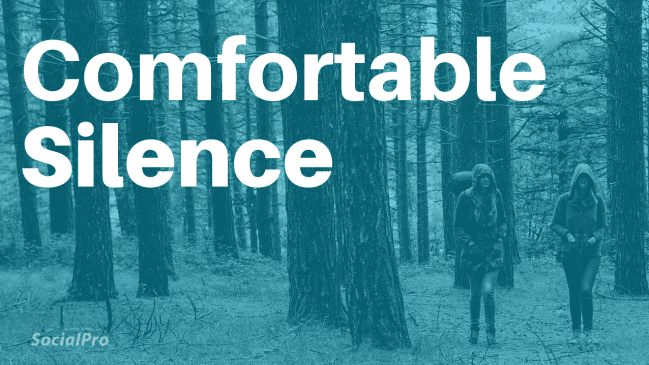I used to think that I had to talk all the time and that silence was awkward. I later learned that silence can give people space to think which helps you make more interesting conversation.
Here’s how to have comfortable silences:
1. Know that silence has a purpose in all conversations
- Constantly talking can make you come off as anxious.
- When you talk about important things, a few seconds of silence helps give better answers.
- When you know a person well, being together without talking can help you bond.
- Silence can be a sign that you feel comfortable with each other.
2. Be calm and relaxed to make silence more comfortable
Be self-confident when you talk and your friend will be comfortable with silences, too.
You don’t need to develop core confidence just to give off a confident vibe. It’s more than enough to use a calm and relaxed voice and relaxed and natural facial expression.
Here’s our guide on how to speak with confidence.
No silence is awkward in itself. It’s how we react to the silence that makes it awkward. If you signal confidence, silence is just silence.
3. Don’t rush your words
Speak calmly when you start talking after a silence. If you rush it, you can come off as if you tried to fill the silence as soon as you could.
If you start talking in a calm way, you signal that you were never bothered by the silence in the first place. This signals to the other person that silences are completely normal when talking to you.
4. Know that no one waits for you to come up with what to say
People don’t wait for you to “solve” the situation by coming up with something to say. If anything, they’re trying to figure out what THEY should say to end the silence.
If you show that you’re comfortable with silence, you will help them be more comfortable. And when you’re both comfortable, it’s easier to come up with things to say.
5. Be aware that small talk usually has less silence than deep conversation
When you make small talk, people usually expect the conversation to flow with very little silence. You can use some strategies here for how to make small talk.
However, if you have a more personal, meaningful conversation, more silences are expected. In fact, silence can improve deep conversations as it gives time to think.[1]
6. Stop viewing silences as failures
I thought that silence meant that I had failed – that I had been unable to make perfectly smooth conversation. But when I got comfortable with silences, I understood that it made the conversation more authentic.
See silence as a break, a time for reflection, a time to gather thoughts, or simply a sign of being comfortable in yourself.[2]
7. Know that many crave silence in conversations
Over the years I’ve learned that lots of people wish conversations could have more silence. If you learn to be comfortable with a few seconds of silence every now and then, a lot of people will credit you for it.
“That’s when you know you found somebody really special, when you can just shut up for a minute, and comfortably share silence.”
– Mia Wallace, Pulp Fiction
8. Practice waiting 2-3 seconds after someone’s stopped talking
Give people 2-3 seconds extra after they’ve stopped talking. It signals that you truly listen rather than just waiting for your turn to talk.[3]
You’ll notice that people often have more to say when you give them space.
You: What was it like growing up in England?
They: It was nice… (a few seconds of silence). …actually, thinking about it, there was always something in me wanting to leave.
9. Make it a habit to reflect before you speak
If someone asks you a question, make it a habit to think for a few seconds before you speak. It shows confidence to be okay with a little bit of silence. People will also appreciate that you take their question seriously and don’t just roll out the standard template.
Avoid filler-words sounds “umm”: Complete silence before you speak signals confidence. If you make it a habit to wait a few seconds, you’ll notice that it stops being uncomfortable.
10. If the other person seems more quiet than usual, they might not be in the mood to talk
Don’t try to talk more if someone adds less to the conversation than usual. It could be that they aren’t in the mood and don’t want to keep talking. Let there be silence. (Click here to learn the signs someone does want to keep talking.)
If the silence is hard for you, it can help to be mindful about it and just accept whatever feelings come up:
11. Use mindfulness to accept silence rather than fighting it
Be mindful of how you feel and what you think when the conversation goes silent.
Pay attention to your feelings and thoughts about the silence, but decide to not act on them. Just let those thoughts and feelings live their own life. This is a powerful way to be more comfortable with silence.[4, 5]
12. See if there’s an insecurity that makes you uncomfortable with silence
If you’re uncomfortable with silence in conversations, even around close friends, it could be because of an underlying insecurity. Perhaps you feel uncertain about their approval or what they might think when you don’t get the feedback through the tone of their voice?
Look for underlying reasons, and work with those to be able to enjoy silence.
13. Learn some strategies to get out of the silence
Knowing that you’ll easily be able to restart a conversation can make you more comfortable with silence.
One powerful strategy is to go back to a previous subject you briefly covered before. Socially savvy people are often more comfortable jumping to subjects that interest them rather than pursuing the current topic until its silent end.
See our guide on how to avoid awkward silence here.
14. Know that silence can be a sign that it’s time to end the conversation
Be aware that sometimes the conversation dies out because it’s time to say goodbye. Think about how much the other person adds to the conversation. If they add less and less, consider politely ending the conversation.
15. Learn some strategies to feel less awkward
Feeling uncomfortable with silence can be a sign of feeling socially awkward. Learn some strategies to overcome feeling awkward. For example, by learning how to act and what’s expected of you in different types of social situations, you can feel more comfortable in your own skin, and as a result, more comfortable in conversations. See our main guide on how to not be awkward for more tips.













